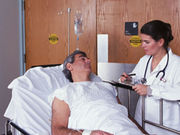Longer sleep duration, increased sleep efficiency cut odds of hyperglycemia, impaired fasting glucose
THURSDAY, Dec. 8, 2016 (HealthDay News) — For hospitalized patients, additional sleep and increased sleep efficiency correlate with lower odds of hyperglycemia and impaired fasting glucose, according to research published online Nov. 30 in Diabetes Care.
Regina H. DePietro, from the Stony Brook University School of Medicine in New York, and colleagues conducted a retrospective analysis of a prospective cohort study involving medical inpatients aged ≥50 years. Two hundred twelve participants were interviewed and their charts were reviewed for demographic data and diagnosis. The correlation between inpatient sleep duration and the proportional odds of hyperglycemia versus impaired fasting blood glucose or impaired fasting blood glucose versus normal blood glucose was assessed.
The researchers found that 34 percent of the participants had diabetes, and there was no difference in objective inpatient sleep measures for those with versus those without diabetes. Each additional hour of in-hospital sleep correlated with lower proportional odds of a higher glucose category the next morning (odds ratio, 0.89; P = 0.043 for hyperglycemia versus elevated and elevated versus normal). Each 10 percent increase in sleep efficiency correlated with reduced proportional odds of a higher glucose category (odds ratio, 0.82; P < 0.001).
“Future research should test whether improving patient sleep in hospitals could represent a novel nonpharmacological approach to reducing the risk of hyperglycemia during hospitalization and ultimately lead to better health and reduced health care costs,” the authors write.
Full Text (subscription or payment may be required)
Copyright © 2016 HealthDay. All rights reserved.








